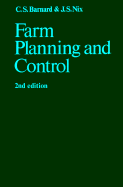Book contents
- Frontmatter
- Contents
- Notice to readers
- Preface to the first edition
- Preface to the second edition
- Selected metric conversion factors
- Part I The organisation of resources
- Part II The organisation of enterprises
- Part III The combination of enterprises
- 13 Principles and procedures in planning enterprise combination
- 14 Budgeting and programme planning
- 15 Linear programming
- 16 Uncertainty and farm organisation and planning
- 17 Further programming techniques
- 18 Matrix construction
- Part IV The control of resources and enterprises
- Selected further reading
- Index
16 - Uncertainty and farm organisation and planning
Published online by Cambridge University Press: 01 June 2011
- Frontmatter
- Contents
- Notice to readers
- Preface to the first edition
- Preface to the second edition
- Selected metric conversion factors
- Part I The organisation of resources
- Part II The organisation of enterprises
- Part III The combination of enterprises
- 13 Principles and procedures in planning enterprise combination
- 14 Budgeting and programme planning
- 15 Linear programming
- 16 Uncertainty and farm organisation and planning
- 17 Further programming techniques
- 18 Matrix construction
- Part IV The control of resources and enterprises
- Selected further reading
- Index
Summary
A major feature of farm production, to which many references have already been made, is the lack of knowledge of the future levels of inputs, outputs and prices, not simply for some long distant point in time but often for only short periods ahead. Uncertainty is synonymous with imperfect knowledge and is reviewed in this chapter from two main aspects: first, how farmers may react to it in their efforts to run viable and long-surviving businesses and, secondly, how it may be accommodated in practical farm planning.
Imperfect knowledge and the farmer
The farmer is commonly regarded as having to bear a greater burden of uncertainty than managers in most other industries. Some indication of this is given by the high degree of variability in farm incomes from year to year. For example, an East Midlands study revealed that the incomes of individual farmers diverged annually by an average of plus or minus fifty per cent from their ten year mean. As seen in Chapter 1, the main cause of such variation is the natural and biological element, both in farm resources and products, which results in many factors over which the farmer has little control.
However, by itself the high degree of variability in farming is only part of the problem, for if farmers knew in advance what variations were going to occur they would be better equipped to make the necessary allowances for them.
- Type
- Chapter
- Information
- Farm Planning and Control , pp. 382 - 411Publisher: Cambridge University PressPrint publication year: 1980



